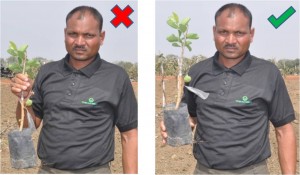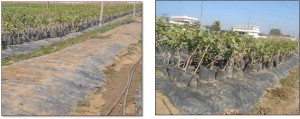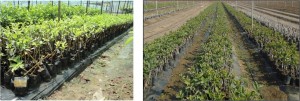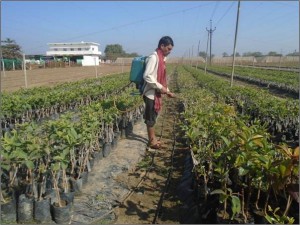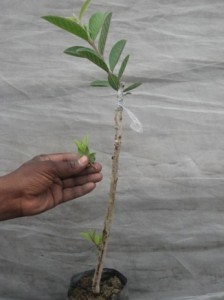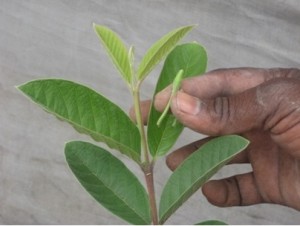VNR Bihi Plants – Care of Young Plants before Plantation
Why do you need to take care of young VNR Bihi plants before plantation?
During photosynthesis, young VNR Bihi plants use light, water, nutrients, carbon dioxide to produce and store carbohydrates. During respiration, plants consume these carbohydrates and oxygen to grow and maintain them. Plants also lose water from their leaves, roots and stem in warm, dry weather.
On their journey from VNR Nursery to Grower’s field, plants get stressed up due to exposure to rapid heating, drop in temperature, lack of water, too much water, and physical abuse such as shaking, slapping, ripping, or squeezing. These stresses upset the balance between photosynthesis, respiration, and transpiration. Plant cells and their contents break down and cease to function normally (roots are generally more sensitive to stress than shoots).
Stressed plants must then divert their efforts from growth to survival, from growing new cells to repairing damaged cells. Repairing damage requires energy which comes from a limited reserve of carbohydrates stored in the roots and stem. This means less energy is available to help the plants establish it after planting. If stresses are severe, long-lasting, or reoccur frequently, roots and/or shoots will be injured or will possibly die. Planting stressed plants can waste your effort and result in a failed plantation.
Generally, a Grower sources plants from local or outstation nursery in various weather conditions. Even if plants are bought from local nursery, it may not be delivered directly to the grower’s/farmer’s field, it may get transported through different mode, routes and handled by multiple agencies. Due to this logistics method of not-so-pleasant and jerky transportation mode; plants are exposed to Disturbance / Shock / Stress. Similarly, sourcing from outstation nursery puts additional stress on plants.
To overcome this undue stress and shocks of transportation, due proper care is required to bring plants back to normal condition. Its recommended that post recovery, plantation can be done on the field. Just like any other living being, Plants too need rest after a long stressful journey, generally this period of rest is suggested to be of 2 days for every 1 day of travelling.
For example:
Journey duration–from nursery to grower’s field = 4 days
Recommended period of rest for plants before plantation = 4 x 2 = 8 days
How to store VNR Bihi Plants before Plantation?
Pre-preparation before Unloading the Plants:
Identify an open, dry, shaded, garbage/clutter free and non-waterlogged area in farm
Create a raised platform/floor with an approximate height of 4 to 6 inches from the ground
– Raised platform is recommended to protect plants from surface heat and water logging
Cover raised platform/floor with polythene sheet (Black sheet with x micron thickness)
– Polythene sheet prescribed to be placed below plants is to create a disconnect from the soil as this will not allow root at the bottom of the VNR Bihi Plant poly packs to penetrate inside the soil of floor bed
If there is no shade above the identified area, where VNR Bihi Plants are to be stored than create a shade above it by using any standard agriculture shade net available in market
– Shade is required to protect plants from direct sun light
– Distance/height between shade net and plants needs to be enough for a person to attend to plant for watering and other up-keeping
Unloading of Plants:
Unload the crates carrying plants, carefully from the transport vehicle and ensure that no damages are inflicted on to the plant due to wrongful handling
Place crates inside the shade net and initiate process of taking out poly bags of plants in a systematic manner
Holding of plants: Holding Plants for putting them in basket or taking out from basket for plantation
Never hold or carry the plant from its stem as it may damage or break the graft/bud union. The safest way to carry or hold the plant is always from its bottom portion i.e. poly bag.
Row wise storage of Plants:
VNR Bihi carrying poly bags are to be stored in erect vertical position
Store plants in straight rows next to each other where each row should have a recommended maximum width of 45 – 50 inches
Maintain a distance/gap of 3 feet in between two rows
Length of a row may vary according need and availability of space
Importance of row wise storage of Plants:
VNR Bihi plants are stored in a row to ensure that person attending to plants can have easy access, can walk freely and inspect every plant
Row wise distribution with walking aisle will help attending person to maintain cleanliness and hygiene in the vicinity of plants
How VNR Bihi plants needs to be maintained during storage period?
VNR Bihi plants during storage period needs to be maintained on 3 counts –
- Irrigation
- Spray of fungicide
- Removal of sprouts, flowers and fruits
Irrigation: Plants needs watering at regular intervals. Plants need to be watered 2 times a day i.e. during morning and evening. Soft irrigation in form of showers be given through rose can or water hose pipe
Check Point
Randomly check/audit the poly bags by press and feel technique to check the adequate moisture in the root zone
Hard pan of soil do not allow water to seep inside the poly bag resulting in wilting / drying of plants, as a result of low moisture content in root zone
Spray of fungicide: Once the plants are stored, it is recommended to undertake a preventive spray of fungicide (COC @2 to 3 grams/litre) and insecticides (Acephate @1.5ml/litre).
Check Point
Carry out periodical inspection of plants to check if there are any infestation of pest and disease
Precaution
Keep a gap of 5 – 7 days between 2 successive sprays
Removal of sprouts, flowers and fruits:
If plants are stored for a period of more than 2 – 3 months than sprouts may show up in region grafting and budding union. As we do not want stem to take strength in rootstock zone therefore it needs to be pinched / removed at periodical intervals.
Similarly, if there are any flowers and subsequent fruits come in the plants than it needs to be removed immediately.

